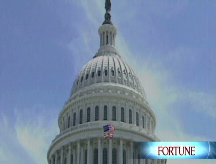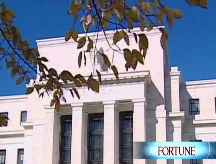For states, it's a 'worst-case scenario'
It's hard to borrow. Tax revenues are declining. States and municipalities are hurting. Get ready for budget and service cuts.
NEW YORK (CNNMoney.com) -- States and municipalities are facing their worst budget crunches in decades - and it's only going to get worse.
As the weakening economy undermines consumers and businesses alike, governments are facing a rare confluence of declines in personal and corporate income taxes, property taxes and sales taxes. This is forcing officials to raise taxes and fees, lay off workers and slash spending - cutting aid to hospitals, schools, Medicaid and more.
At the same time, as unemployment and inflation rise, demand for public services and the cost of delivering them is on the increase.
On top of all that, the credit crunch has made it virtually impossible for some governments to borrow to cover short-term financing needs, forcing states such as California to appeal to Washington for help.
Worst of all, most experts are predicting the fiscal squeeze will only deepen.
"It's all just starting," said Chris Hoene, director of the Center for Policy and Research at the National League of Cities. "It's going to be at least three years of pretty tough sweating."
States and municipalities usually suffer when the national economy turns south, but many experts said they can't remember a time since the Great Depression when all sources of tax revenue have declined simultaneously. During the last recession, for instance, personal income taxes fell after the stock market crash, but sales taxes remained strong as consumers kept spending.
No such luck these days. States' corporate income taxes fell 8.3% and sales taxes 1.4% in the second quarter from the year-ago period, according to a report from the Nelson A. Rockefeller Institute of Government, a public policy group.
Revenue from personal income taxes rose, but only because it included income earned in 2007, when the economy was stronger. States should expect sharp declines in income tax revenue later in the fiscal year, as companies lay off workers and slash bonuses and the stock market declines cut capital gains, said Donald Boyd, senior fellow at the institute.
Property taxes, which are a key source of funding for local governments, are expected to drop by 3.6% in 2008 as home values fall, according to the National League of Cities.
In Nevada, for instance, officials are scrambling to cope with severe declines in housing values and a slide in tourism. As a result, sales taxes for fiscal year 2008 came in 12% lower than projected, property transfer taxes 31% lower and gaming taxes 16% lower. (Nevada has no state income tax.)
These shortfalls opened a $1.2 billion hole in the state's $7 billion general fund, which covers Nevada two-year budget cycle, forcing the Gov. Jim Gibbons to impose some drastic cuts. State agencies are being asked to cut their spending by 14%, vacant positions are going unfilled and some staffers in the corrections and secretary of state departments may get laid off. The state drained its rainy day fund and has put off all capital improvement projects not already underway.
For residents, this means no additional children can enroll in the State Children's Health Insurance Program and some pregnant women have lost access to state-funded health services. The expansion of the full-day kindergarten program has been delayed and funds for a deaf students' magnet program eliminated.
"Other than in the Great Depression, Nevada has never experienced such a tremendous shortfall in anticipated revenue, which has stressed the state fiscal system and resulted in reductions in state services," said Ben Kieckhefer, Gibbons' spokesman.
Nevada residents are far from the only ones feeling the pain. Only three months into the fiscal year in most states, 15 states are already projecting deficits of a total of $5.9 billion, according to a report by the Center on Budget and Policy Priorities. Nearly all of them are among the 29 states that already cut services or raised taxes to close a $8 billion combined budget shortfalls for fiscal year 2009, which in most states started on July 1.
Tennessee is looking to reduce its state workforce by at least 2,000 employees, or 5% of its workforce according to the center's report. Illinois has reduced funding for child welfare, mental health and youth services. Rhode Island has frozen state aid for K-12 education at last year's levels and has reduced the number of children who can be served by Head Start and similar services by 550.
"People are going to feel it in a pretty widespread way," said Nicholas Johnson, director of the State Fiscal Project for Center on Budget and Policy Priorities.
Local governments are fairing no better. Nearly two in three city finance officers say their cities are less able to meet their fiscal needs than a year ago, according to a recent National League of Cities study. They expect revenues to decline by 4.3% and spending by 1.5%
Indianapolis, for instance, is cutting its budget by 5%, while Columbus is trimming 100 jobs. All New York City agencies are being told to cut their budget by 2.5%, on top of reductions implemented last year.
"Every single agency is going to have to do more with less," New York City Mayor Michael Bloomberg said in a radio address late last month.
Officials' struggle to contain their budgets is all the more difficult when expenses and demand for services are on the rise.
With inflation creeping up, governments are paying more for fuel, energy, food and health care. They are shelling out 6.6% more for their purchases this year over last, according to the Rockefeller Institute.
And as people lose their jobs, they turn to local governments for support. More apply for Medicaid or go to public hospitals' emergency rooms if they don't have health insurance. They look for assistance with temporary housing, food and other social services.
The foreclosure crisis is also wreaking havoc with government budgets, experts said. Empty houses require more visits by - and more spending on - building inspectors, police and health code officials.
Though times are tough, officials are very reluctant to raise taxes, said Scott Pattison, executive director of the National Association of State Budget Officers. Nevada, for example, is slogging through its financial turmoil without increasing taxes.
Other states, however, have no choice. Michigan and Maryland enacted tax increases, while New Hampshire and New York are increasing cigarette taxes, according to the Center on Budget and Policy Priorities. New Jersey, meanwhile, is eliminating property tax rebates for households with incomes of more than $150,000 and is reducing property tax rebates for some other residents. A public utilities tax that was scheduled to end in 2010 will continue to 2013.
"We're preparing for the worst-case scenario," said Tom Vincz, spokesman for the New Jersey Office of the State Treasurer.
The credit crisis has also sent some government officials into a panic. Some states and municipalities rely on short-term borrowing to carry them through until the next batch of revenue comes in. But now, investors are shying away from buying any debt or are demanding yields higher than governments want to pay. This led California Gov. Arnold Schwarzenegger to send a letter to Treasury Secretary Henry Paulson on Oct. 2 warning that the state might ask for a $7 billion emergency loan to cover daily operations until the credit markets unfreeze.
The credit crunch comes at a particularly bad time for state and local governments, experts said.
"If revenues were coming in strong, there wouldn't be as much need to borrow," said Johnson said. ![]()






